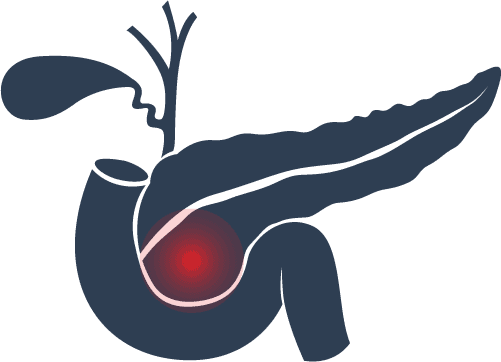What is a pancreas?
The pancreas is a gland organ, about 15cm long and shaped like a flat pear, that is located in the abdomen between the stomach and the spine. The pancreas is a vital organ and has two main functions: exocrine and endocrine.
Exocrine – produces specialised proteins called enzymes that help the body digest and break down food.
Endocrine – produces hormones (such as insulin or glucagon) which helps control blood sugar.
Recognising pancreas problems
Pancreatitis can cause severe pain in the upper part of your stomach that radiates into your back. You may experience nausea and vomiting, a fever, swollen tender stomach or a higher heart rate.
If you are experiencing any of these symptoms you should seek medical attention.
Pancreatic Cancer
When healthy cells in the pancreas stop working correctly and grow out of control, they form a tumour; we call this pancreatic cancer. Diagnosis of pancreatic cancer can be challenging, as symptoms often do not appear until the later stages and can resemble the symptoms of other conditions.

Pancreatic Cysts
Pancreatic cysts are small pockets of fluid that can be found on or inside the pancreas. Most pancreatic cysts aren’t cancerous and many don’t cause symptoms. However some pancreatic cysts do become cancerous, so your doctor might take a sample of the cyst liquid to test for cancer cells, or may monitor the cyst over time for changes.
Neuroendocrine Tumours
Neuroendocrine cells produce hormones that may be released into the bloodstream. Pancreatic neuroendocrine tumours occur when cancer cells form in the endocrine part of the pancreas. Neuroendocrine tumours can also occur in other parts of the body (such as the small intestine), however they are rare.

Robotic Pancreatic Surgery
A/Prof Charles Pilgrim offers his patients the opportunity of robotic assisted pancreatic surgery using the da Vinci Xi surgical system. This world leading robotic surgery system translates A/Prof Pilgrim’s hand movements in real time, but with a greater range of motion, making it possible for him to operate through a few small incisions
If you would like to make an appointment to discuss your pancreatic issues please call our practice on (03) 9509 4811 to make an appointment, or you can book an appointment online

